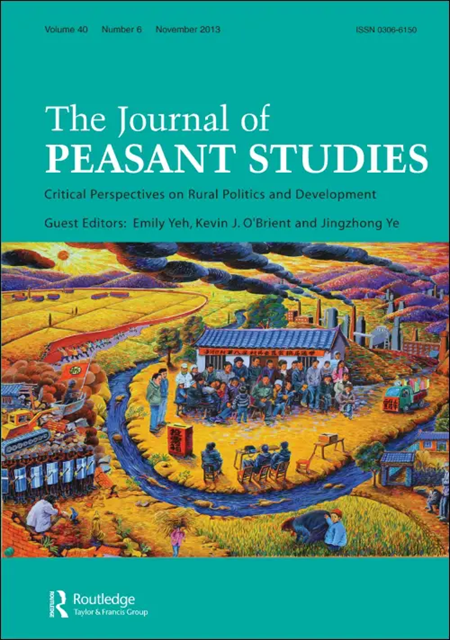Anything but a story foretold: multiple politics of resistance to the agrarian extractivist project in Guatemala
IF 4.8
1区 社会学
Q1 ANTHROPOLOGY
引用次数: 98
Abstract
Sugarcane and oil palm agribusinesses are in the vanguard of an emergent project of agrarian capitalism in Guatemala, which is defined here as a financialized and flexible type of agrarian extractivism. Meanwhile, Maya-Q´eqchi´ residents of the northern lowlands believe that the changes in the labor regime, land relations and the agro-ecosystem that the expansion of these agribusinesses has brought threaten their subsistence in multiple and unfamiliar ways. Indeed, growing difficulties in dealing with (vital) grievances is leading many, even those who initially welcomed the corporate sugarcane and oil palm plantations, to transform their unrest into a practice of resistance. Elaborating on what is presented here as a multiple politics perspective, this contribution discusses the nature and character of such contemporary political dynamics of agrarian change. The forms, strategies and practices of the two main and most antagonistic repertoires of contention are explored here: the one in ‘defense of territory’ and the one in the promotion of the ‘agrarian extractivist project’. The tensions across and within multiple corporate, state and social actors who are pushing for, resisting, complying with or operating at the most violent margins of the agrarian extractivist project are also examined. By assessing continuities and ruptures between current and previous cycles of contention around the control of land, water and other natural resources, this paper stresses the often forgotten lesson about trajectories of agrarian change not being a story foretold, but the product of multiple and dynamic politics.任何事情都不是一个故事所预示的:危地马拉对土地开采计划的多重政治抵抗
甘蔗和油棕农业综合企业是危地马拉新兴的农业资本主义项目的先锋,这里将其定义为一种金融化和灵活的农业榨取主义。与此同时,北部低地的玛雅- q ' eqchi '居民认为,这些农业综合企业的扩张带来的劳动制度、土地关系和农业生态系统的变化,以多种不熟悉的方式威胁着他们的生存。事实上,在处理(重大)不满方面越来越困难,导致许多人,甚至是那些最初欢迎甘蔗和油棕种植园的人,将他们的骚乱转变为一种抵抗行动。这篇文章详细阐述了这里所呈现的多重政治视角,讨论了当代农业变化的政治动态的性质和特征。本文探讨了两种主要的、最具对抗性的争论方式的形式、策略和实践:一种是“保卫领土”,另一种是促进“土地开采计划”。多个公司、国家和社会行动者之间和内部的紧张关系,他们正在推动、抵制、遵守或在农业采掘者项目的最暴力边缘运作。通过评估当前和以前围绕土地、水和其他自然资源控制的争论周期之间的连续性和破裂性,本文强调了一个经常被遗忘的教训,即土地变化的轨迹不是一个预言的故事,而是多种动态政治的产物。
本文章由计算机程序翻译,如有差异,请以英文原文为准。
求助全文
约1分钟内获得全文
求助全文
来源期刊

Journal of Peasant Studies
Multiple-
CiteScore
10.50
自引率
17.60%
发文量
99
期刊介绍:
A leading journal in the field of rural politics and development, The Journal of Peasant Studies (JPS) provokes and promotes critical thinking about social structures, institutions, actors and processes of change in and in relation to the rural world. It fosters inquiry into how agrarian power relations between classes and other social groups are created, understood, contested and transformed. JPS pays special attention to questions of ‘agency’ of marginalized groups in agrarian societies, particularly their autonomy and capacity to interpret – and change – their conditions.
 求助内容:
求助内容: 应助结果提醒方式:
应助结果提醒方式:


